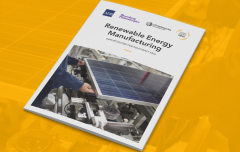Southeast Asia Renewable Energy Manufacturing Initiative
With a focus on Southeast Asia, SEforALL partnered with the Asian Development Bank, ClimateWorks Foundation, and Bloomberg Philanthropies to develop a study exploring the untapped renewable energy potential and manufacturing capabilities of ASEAN countries.
SEforALL continues to engage with governments and regional stakeholders, including the ASEAN Secretariat, to support the development of green value chains in the region through data and analytics, contribution to regional processes (e.g. ASEAN Green Minerals Development Vision) and investment facilitation.
Phase 1
Consists of a high-level scan of 10 ASEAN markets on domestic demand, manufacturing capabilities, current regulatory mechanisms and competitive advantage supplemented with data from partners and expert inputs.
Phase 2
Consists of deep-dives on 4 prioritized countries (Indonesia, Philippines, Thailand, Vietnam) plus one of the emerging economies (Cambodia), with respect to selected RE sectors identified in Phase 1. Further, assesses the scale of domestic demand, providing a detailed analysis of existing players and value chain capabilities (e.g., through interviews of manufacturers). Identifies the most feasible areas to pursue based on benchmarking and combination of factors.
Phase 3
This phase assesses the value creation opportunity (i.e., high-level impact estimates on GDP, jobs created, and how these initiatives provide low-cost options for the countries to achieve their NDCs) and develop 5-year roadmaps for the analyzed countries/sectors, with systematic recommendations, areas of interventions, investments needs, as well as roles and responsibilities for the different stakeholders. As a next step, SEforALL and partners are continuing with the final phase of the project and organizing with partners the official launch of the report and the overall initiative.
Southeast Asia has a very strong existing manufacturing capability…this presents a major opportunity for your nations to build the next generation of renewable energy manufacturing and industrial capabilities in order to meet both local demand as well as play a central role in the regional supply chain.

Damilola Ogunbiyi
CEO and Special Representative of the UN Secretary-General for Sustainable Energy for All and Co-Chair of UN-Energy
An estimated $90-100 billion of potential revenue in Southeast Asia’s low-carbon mobility and clean power segments is available for capture by 2030.
Many countries in the region can secure economic growth, high-quality jobs, and lower-cost pathways to national climate targets by aggressive measures to scale-up domestic renewable energy manufacturing.
The policy research initiative shows how many ASEAN countries can secure economic growth, high-quality jobs, and lower-cost pathways to national climate targets by aggressive measures to scale-up domestic renewable energy manufacturing.
Further advancing domestic manufacturing capabilities in Southeast Asia could contribute to unprecedented socio-economic development.
90 bn $
Estimated aggregated revenues caused by new manufacturing projects, by 2030.
6 m
New renewable energy jobs, until 2050.
